Arts & Entertainment
Local gay couple proceeds with wedding plans despite lockdown
Family and friends gather virtually to celebrate same-sex nuptials
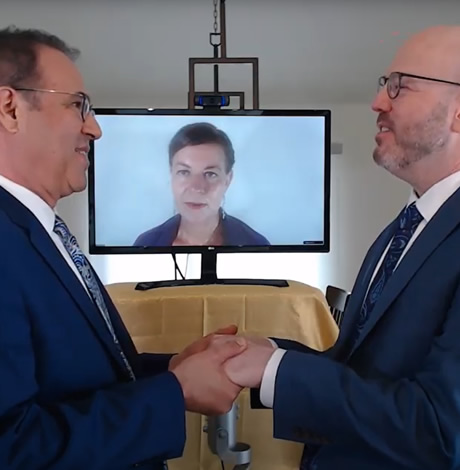
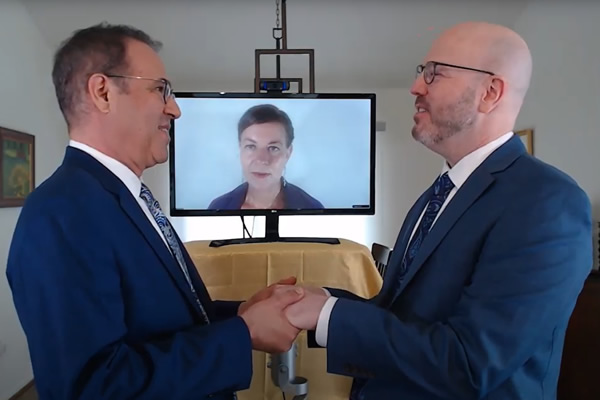
When Harry met Brian in 2015, the U.S. Supreme Court had just legalized same-sex marriage in all 50 states. Five years later around their kitchen table they agreed they were going to be damned if a pandemic stopped them from exercising that right.
“I played a lot of weddings,” says D. Brian Lee, a 58-year-old musician and definitely the feistier of the two, having been out since he was a teen. “I felt so down on the institution because it was never going to be me, but now we’ve won.”
“It was most important to us for people to honor and witness our wedding,” says Harry Fox, a 62-year-old health care administrator who had been married previously to a woman for 20 years. He had to overcome his own internalized homophobia to find strength and happiness.
On Saturday, April 25 Lee and Fox held their wedding virtually and became one of many couples around the world who didn’t let COVID-19-induced stay-at-home orders lockdown their love.
Internationally, the Singapore parliament is even considering a bill to further legalize virtual marriages during the crisis, according to The Straits Times.
In the U.S., virtual weddings via YouTube, Zoom and other conferencing platforms are becoming so prevalent that The Wedding Spot blog gives a detailed how-to for planning one.
NPR also reports New York Gov. Andrew Cuomo (D) signed an executive order on April 18 that allows clerks to perform wedding ceremonies via video conferencing platforms and for couples to get their marriage licenses remotely. And a quick Twitter search of the #ZoomWedding hashtag will find other creative couples taking advantage of similar marriage expansions in their areas.
Aaron Tax of SAGE, an LGBTQ senior advocacy organization, is not surprised that many choose the legal protections of marriage during a health crisis.
“Marriage may provide psychological benefits and more tangible benefits like economic security and certain legal rights to couples,” he says. “There really is no shorthand for saying ‘my wife’ or ‘my husband’ when an emergency arises and you want to explain the nature of your relationship.”
Fox agrees. When he was separated from his wife and had begun dating Lee, she became stricken with cancer. He admitted when he went to the hospital with their son, now 23, to visit her there was a certain legitimacy and “straight privilege” that made things easier for them during a difficult time.
“I think there’s a tremendous difference in the eyes of the world between a married couple and those who are living together,” Fox says. “And it plays out in the hospital room. There are significant rights in this culture that marriage confers and (Brian and I) want to be there for each other without anyone questioning that we have a right to be there.”
Lee also remembers seeing “unmarried partners being locked out of hospital rooms” of dying loved ones during the height of the HIV/AIDS crisis in the 1980s. He recalled this as a dark time filled with “some very inhumane treatment,” and this moved him to respect the institution of marriage.
That’s why he insisted that Fox divorce his wife before moving in with him.
“That was a trying and difficult time,” Fox says. “It was important for me to help my wife, but Brian was clear that I needed to be divorced before we moved in together.”
Fox’s wife eventually died, though she did get a chance to meet Lee before she died. The two of them had a quiet conversation while Fox made dinner in the other room. Later they moved together into the rented house they enjoy now in Potomac, Md., and their traditions of kitchen table conversations began.
“We meet every morning and every evening at this table to talk,” Fox says. “When you think about being with someone for the rest of your life, if it’s not fun to talk to the other person, you shouldn’t be with them.”
Lee was more impassioned in his agreement.
“I don’t want to have to pry the book open with a partner,” he says. “But with Harry, it’s very easy.”
However, it wasn’t so easy in the beginning as Fox was still struggling with his sexuality. Unlike Lee, he came out in his 50s and there were a few conditioned beliefs he had to lay to rest.
“In the beginning of our relationship, there was my own internalized homophobia,” Fox says. Sure, he had been married before, but that was in a traditional Jewish ceremony. “Did I see myself married to another man? Do I see myself kissing another man in public?”
As a musician, Lee calls Fox’s anxieties a form of “stage fright” which he still sees in his partner time and again.
“There have been times when I feel that if Harry is feeling a little anxious about something, I’ll say, ‘Ah, he’ll get through it.’ It just takes time and talking.”
And talking is something they’ve done plenty of over the years. As the two of them continued to date and their bond grew, Fox came out to more family and friends.
“But I felt I needed to come out at work,” he says. “Since work was such a large part of my life, in order to feel like an integrated human being and to get rid of the internal compartments I had maintained throughout my adult life.”
This was a difficult decision for him since at the time Fox was the chief information officer for a large health care insurance provider and responsible for over 2,500 employees. And from a legal standpoint, the U.S. Supreme Court is still weighing whether or not it is unconstitutional for employers to fire workers based on sexual orientation or gender identity.
Still, he knew then that he wanted Lee to be a part of his life. All of it.
“After I came out at work, I took Brian as my date to a dinner event with work colleagues,” Fox says, still sounding a little surprised that everything worked out so well. “I was also invited to join the board of Whitman-Walker Health.”
Fox says coming out fully swept away a lot of his remaining internalized homophobia and became a “very powerful life-changing experience.”
Fox and Lee felt their shared experiences together strengthened their resolve to get married, not just as an act of social justice but because they loved one another and were growing together. Then COVID-19 hit.
It was time for another discussion around the kitchen table.
“We talked about cancelling the physical wedding, but it took such a long road to get here,” Fox says. “In the real world the restrictions will ease up slowly, and there probably wouldn’t be another time to get people to fly in until later next year.”
Both he and Lee had already lost older family members and feared more wouldn’t last long enough to see them married. Lee added that when you hit your middle years, you just don’t know how much time older family members have left. Finally, they decided, “there will never be a perfect time … let’s just do it.”
“And I know people in our social circles love our parties,” Lee says. “And this was going to be the ultimate party.”
Fox and Lee have IT backgrounds and were familiar with the technology needed to pull off a virtual wedding. They decided to live-stream the ceremony on YouTube and hold the virtual receiving line via Zoom while sending out wedding cupcakes to family and friends.
“We did a butt-load of tests,” Lee says. “We had a dry run to make sure everyone could connect and with sound. I set up YouTube lives before at my other job. I still kept praying the internet keeps working.”
They had gotten their marriage license prior to the pandemic and its social distancing restrictions and business closures. They looked into Maryland marriage laws and found a confusing passage they reasoned meant the officiant needed to be physically “in the county in which” the marriage license is issued.
So their officiant, Hanna Nielsen-Jones, arranged for another officiant to marry them an hour before their virtual wedding, in their driveway — and six feet away.
The ceremony was posted on YouTube which used multiple layers of technology, to include the Nielsen-Jones officiating via video to the couple who then projected themselves via video for their guests to view. The virtual receiving line followed where family and friends expressed their warm wishes via Zoom and toasts were shared.
“I liked it all. With all of the things we were afraid could go wrong, nothing went wrong,” Fox says. “My son spoke and it was really lovely.”
“Most of the people dressed up like they were going to a real wedding,” Lee says. “And it looked fabulous. We drank a lot of champaign on this end also.”
Despite all of the fear and the obstacles, the newlyweds said it was worth it to be creative and have their wedding rather than cancel it. Right now their “honeymoon” consists of their nightly walk through their diverse neighborhood as their permitted lockdown activity. They agree it feels a little different with the rings on their fingers though they don’t advertise their new status with their neighbors.
But Lee holds out hope for a two-week trip to Spain.
“We hope to get our butts back to Barcelona,” he says, though he knows it probably wouldn’t be this summer.
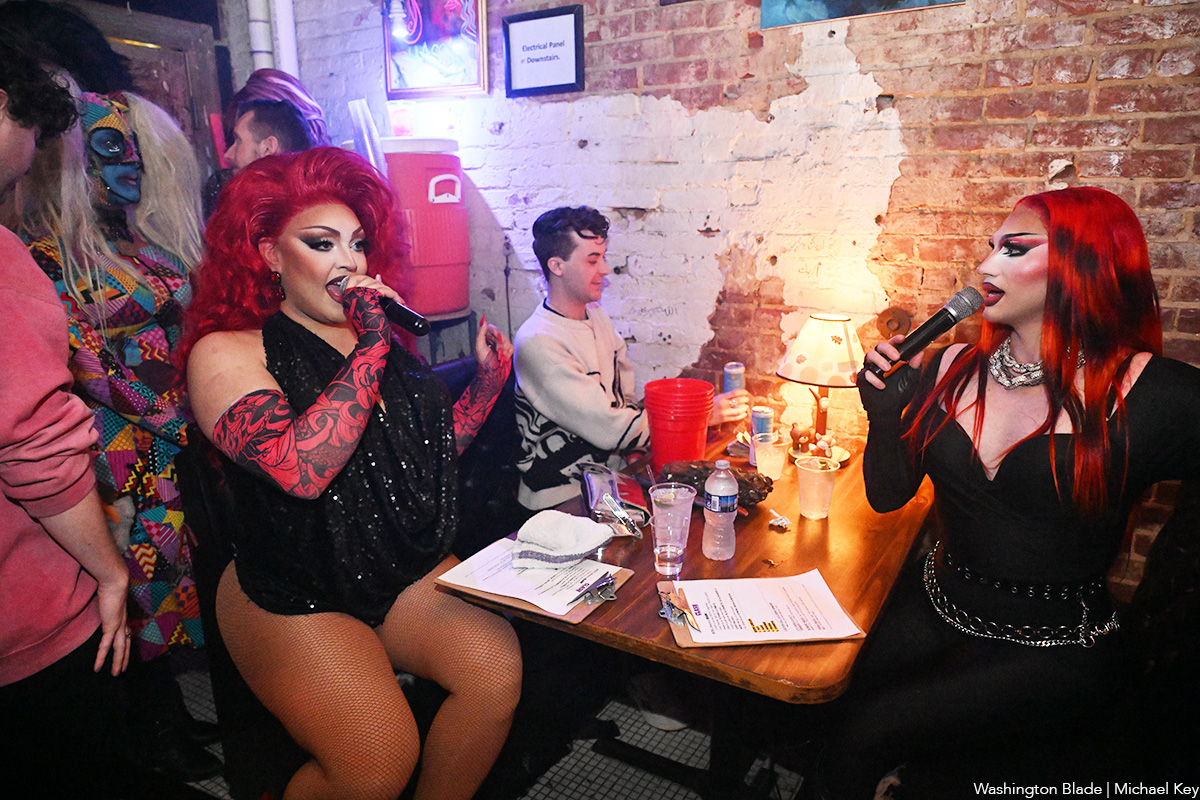
Crimsyn and Tatianna hosted the new weekly drag show Clash at Trade (1410 14th Street, N.W.) on Feb. 14, 2026. Performers included Aave, Crimsyn, Desiree Dik, and Tatianna.
(Washington Blade photos by Michael Key)
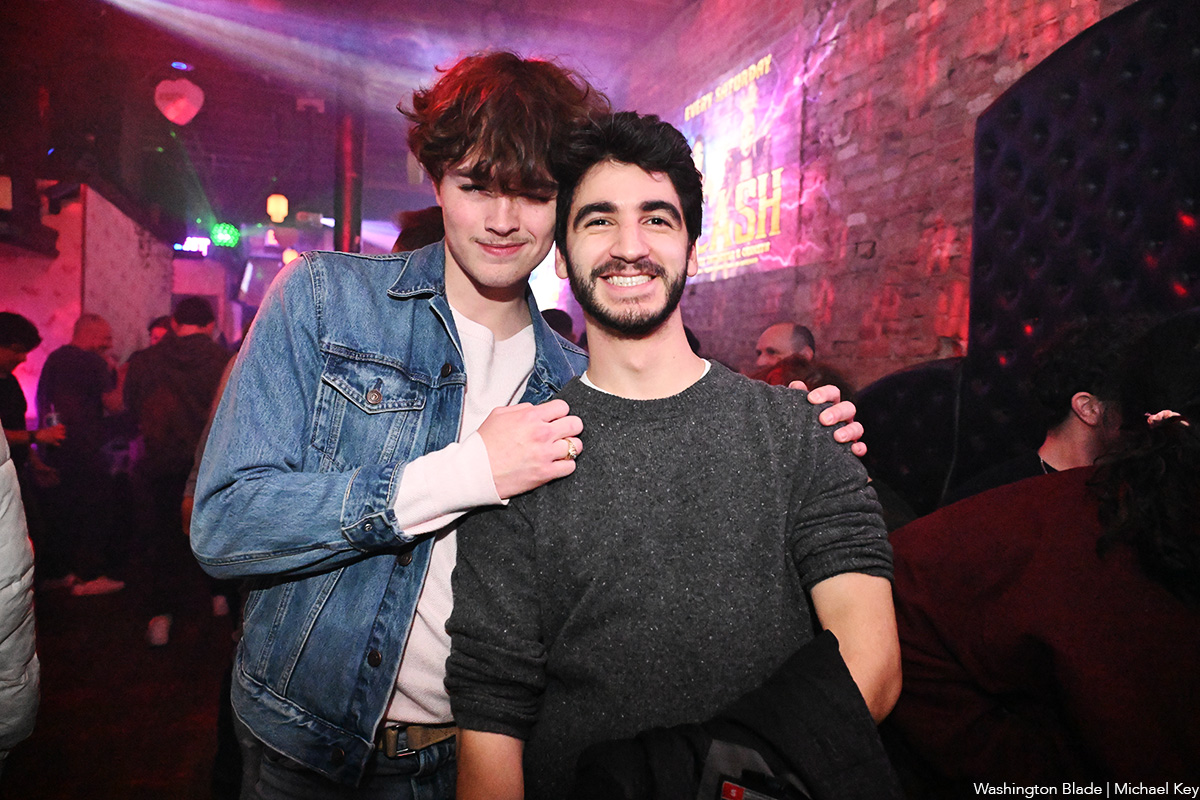
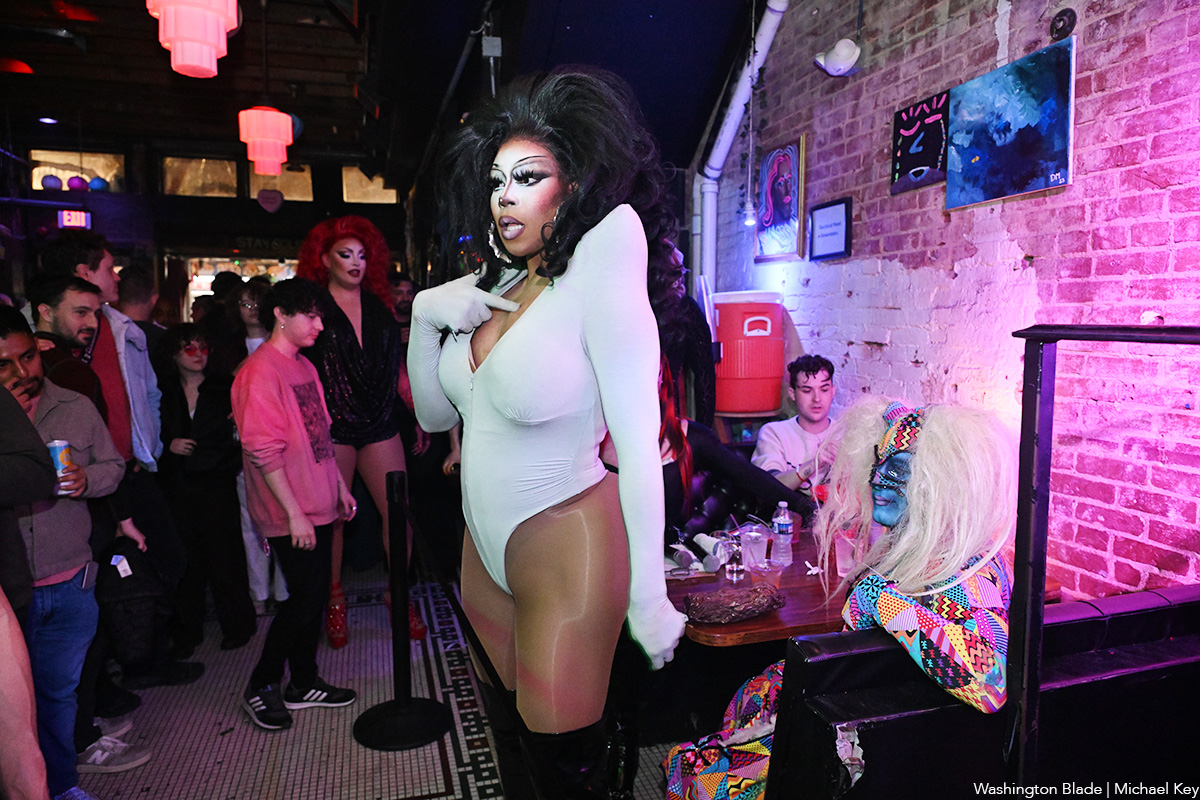
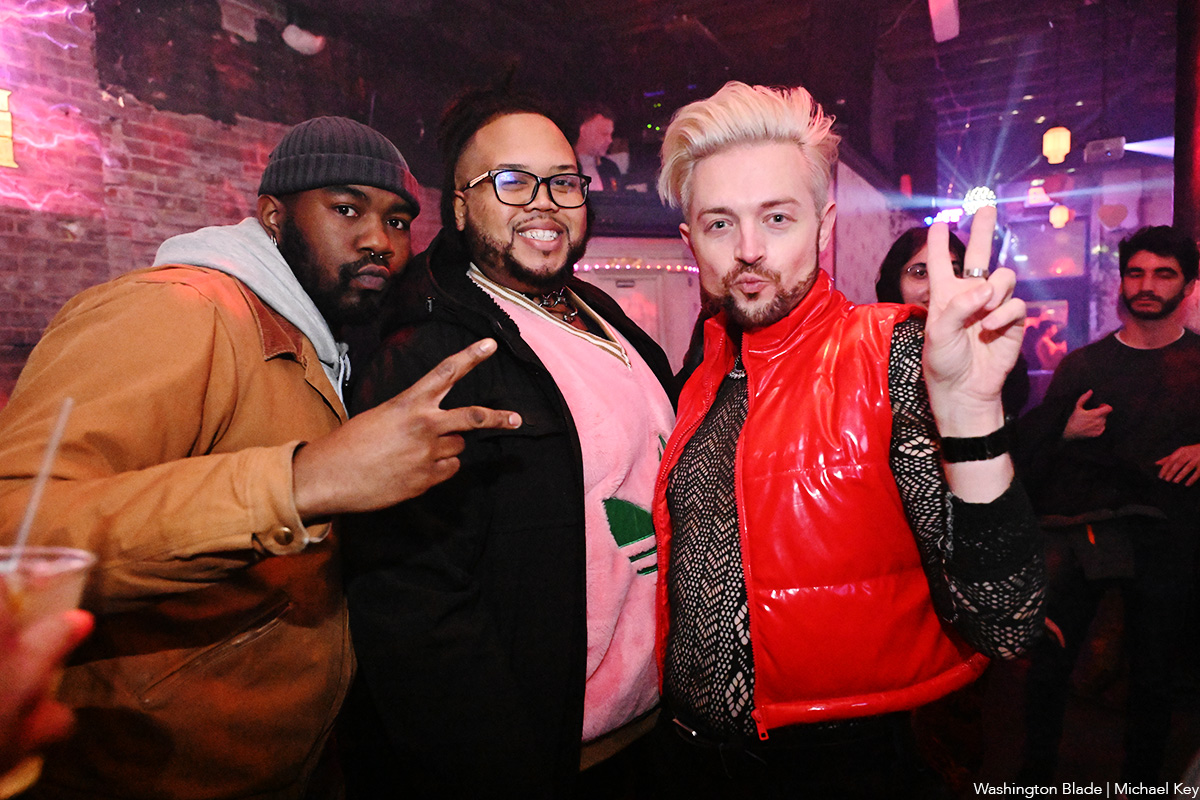
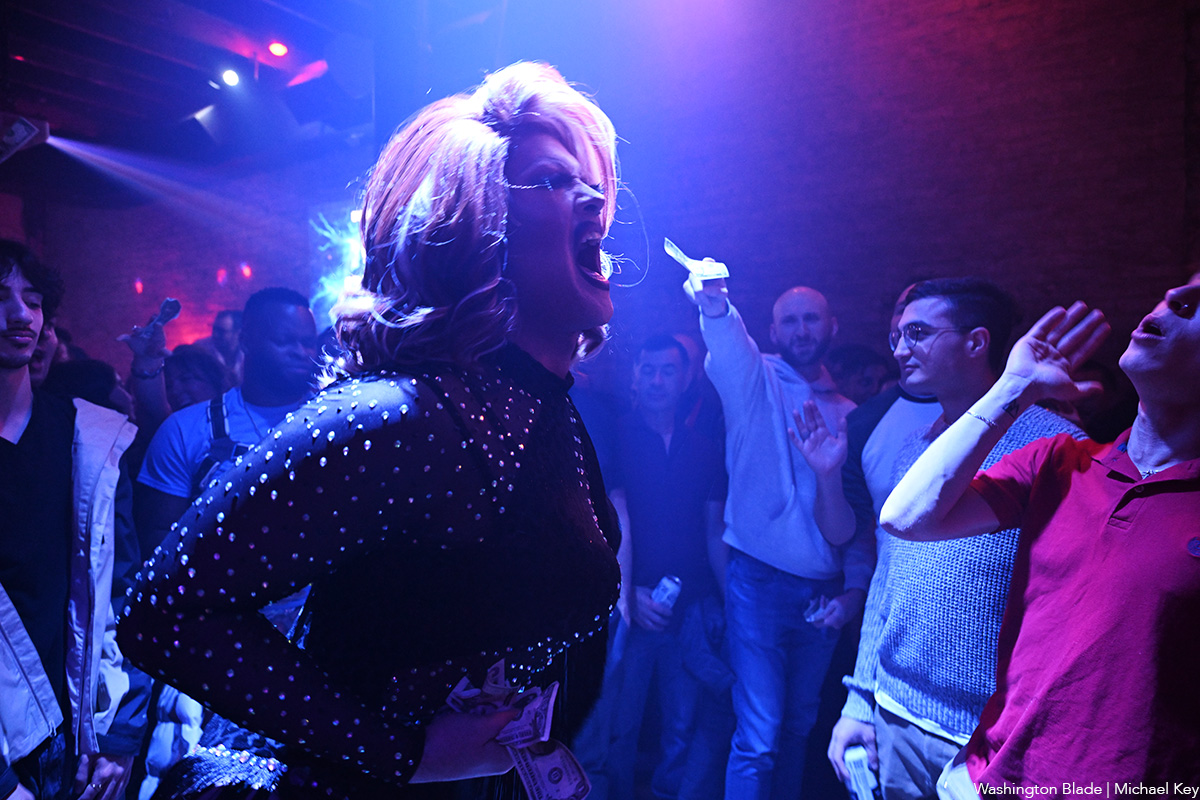
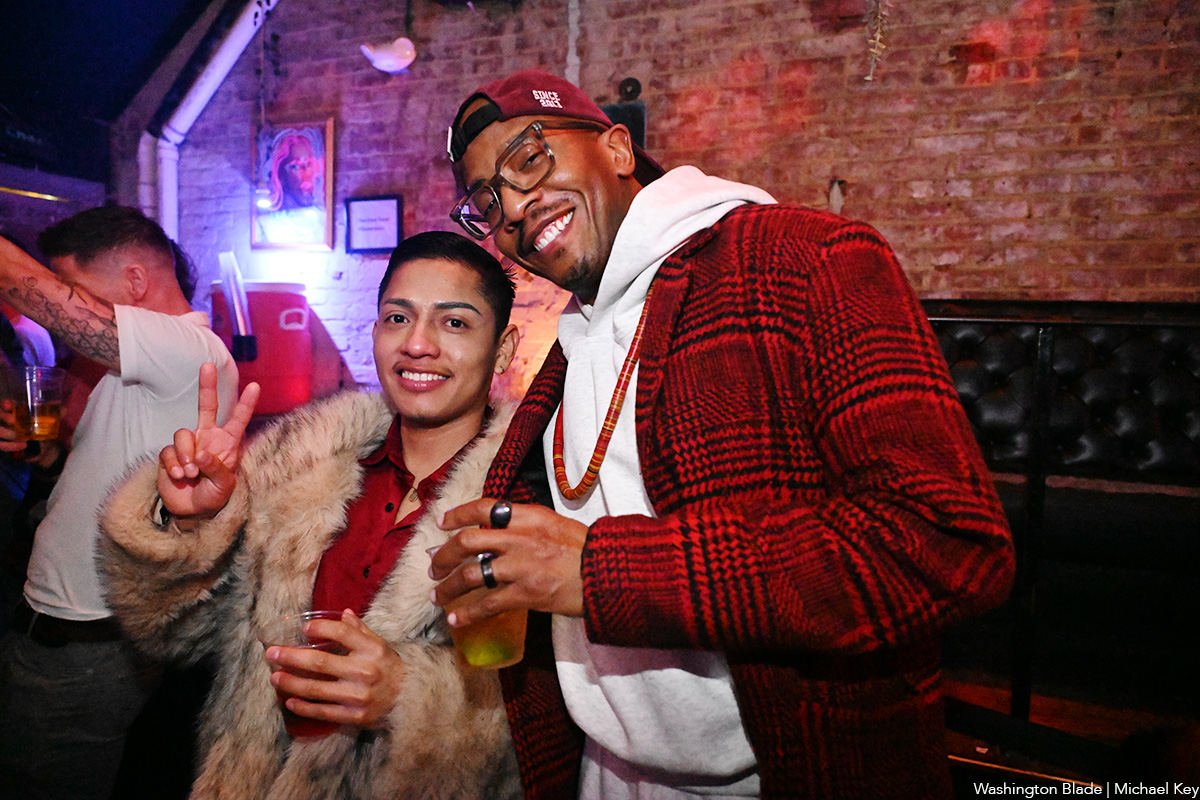
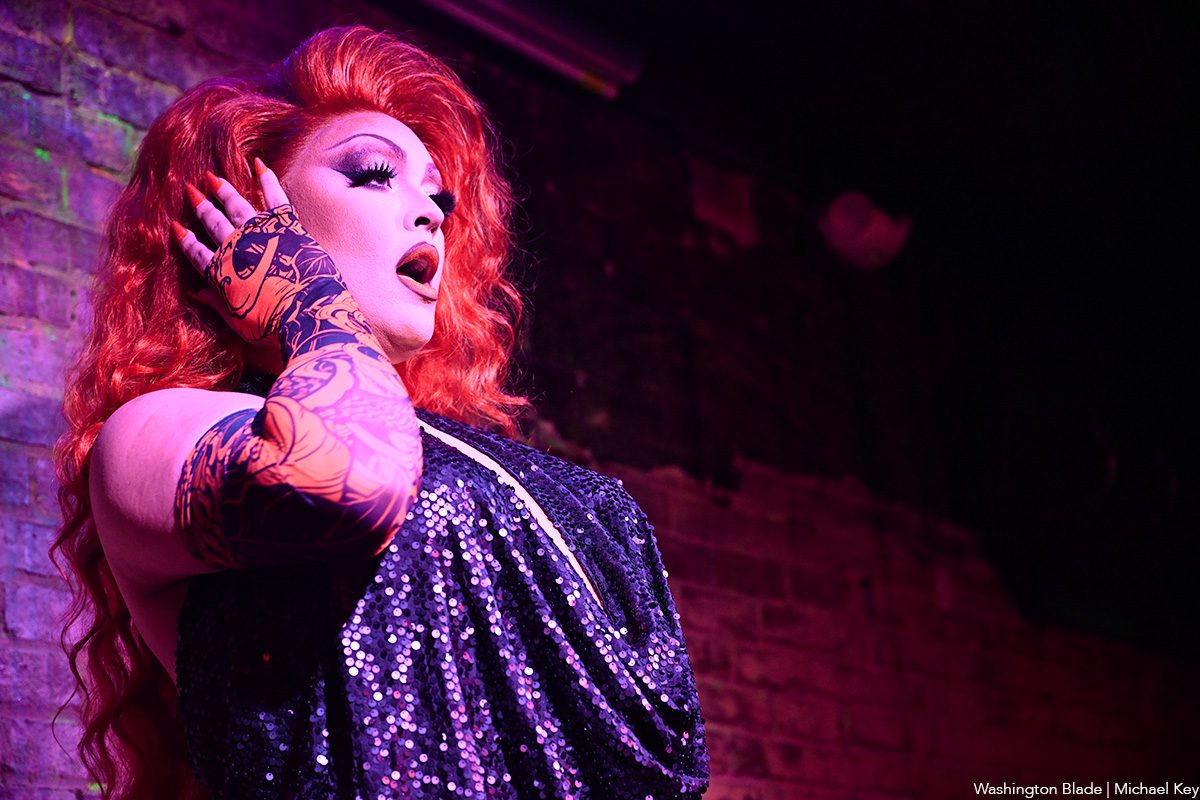
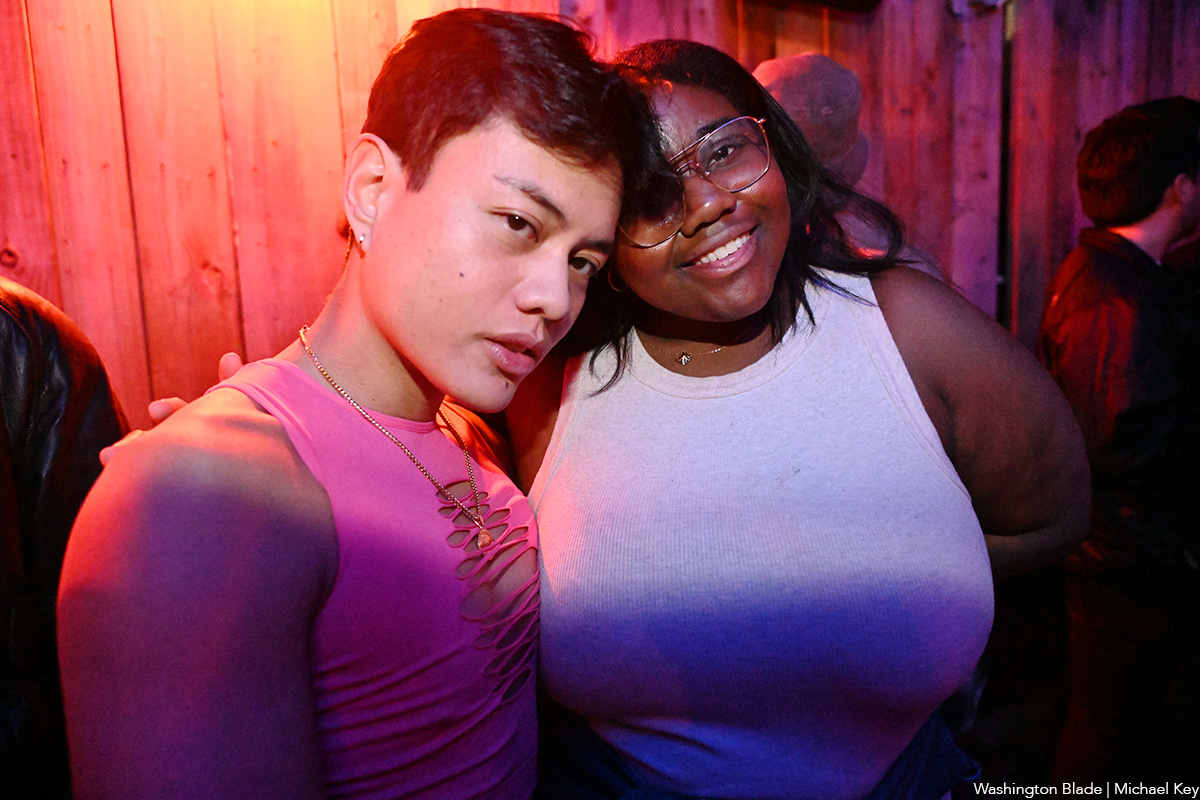
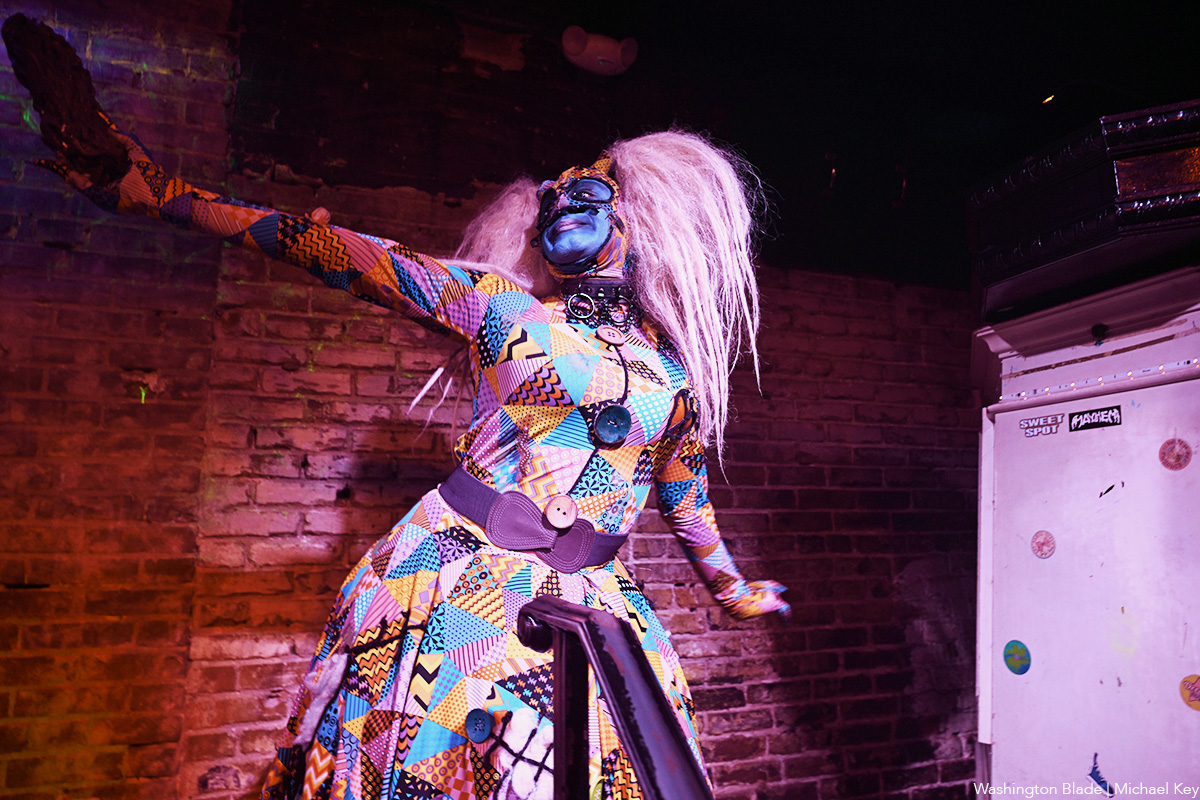
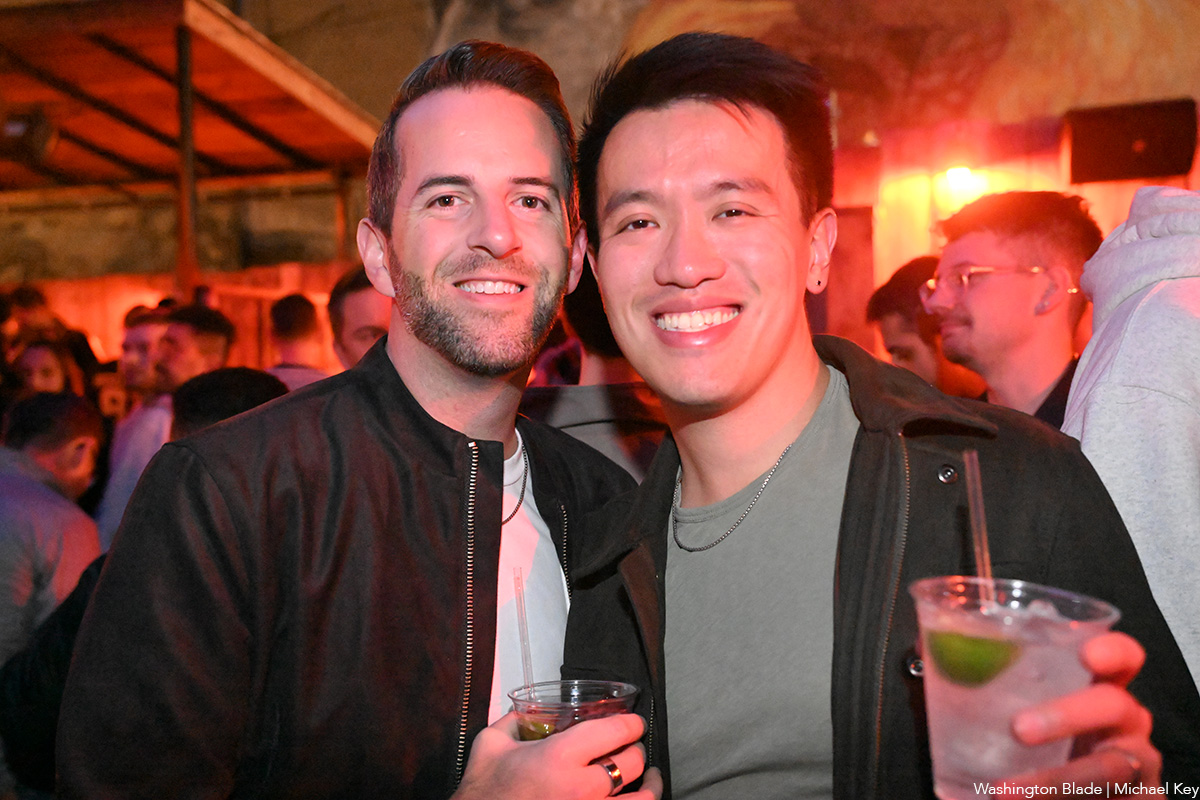
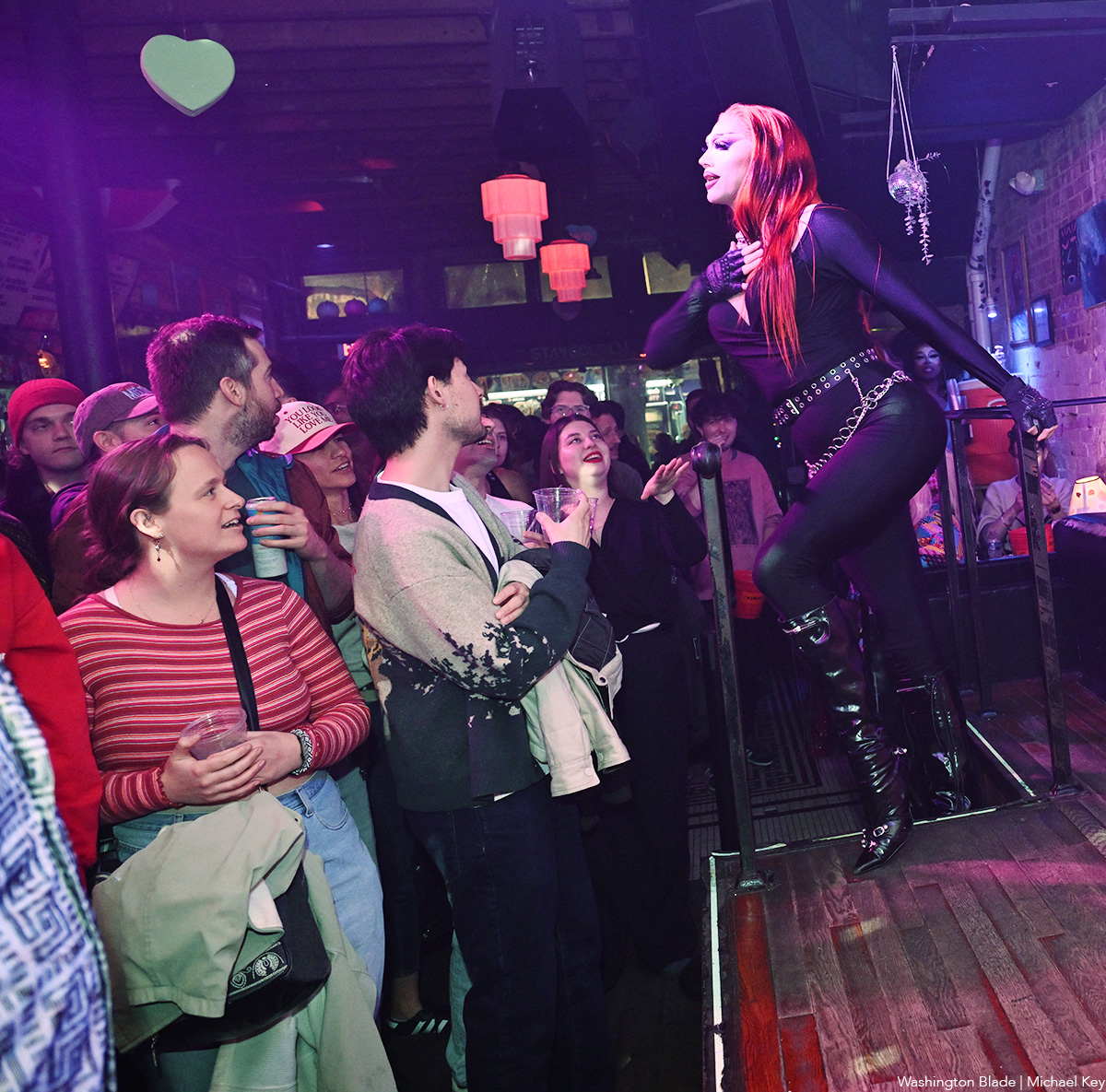
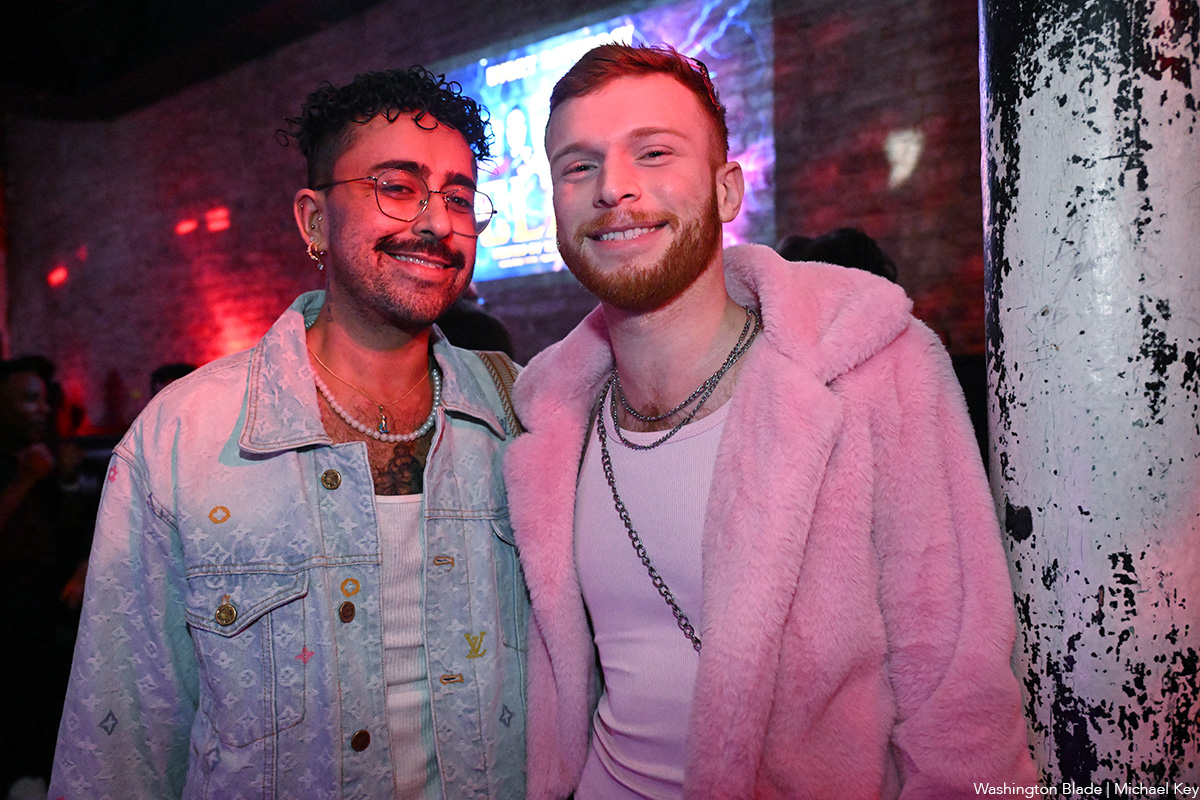
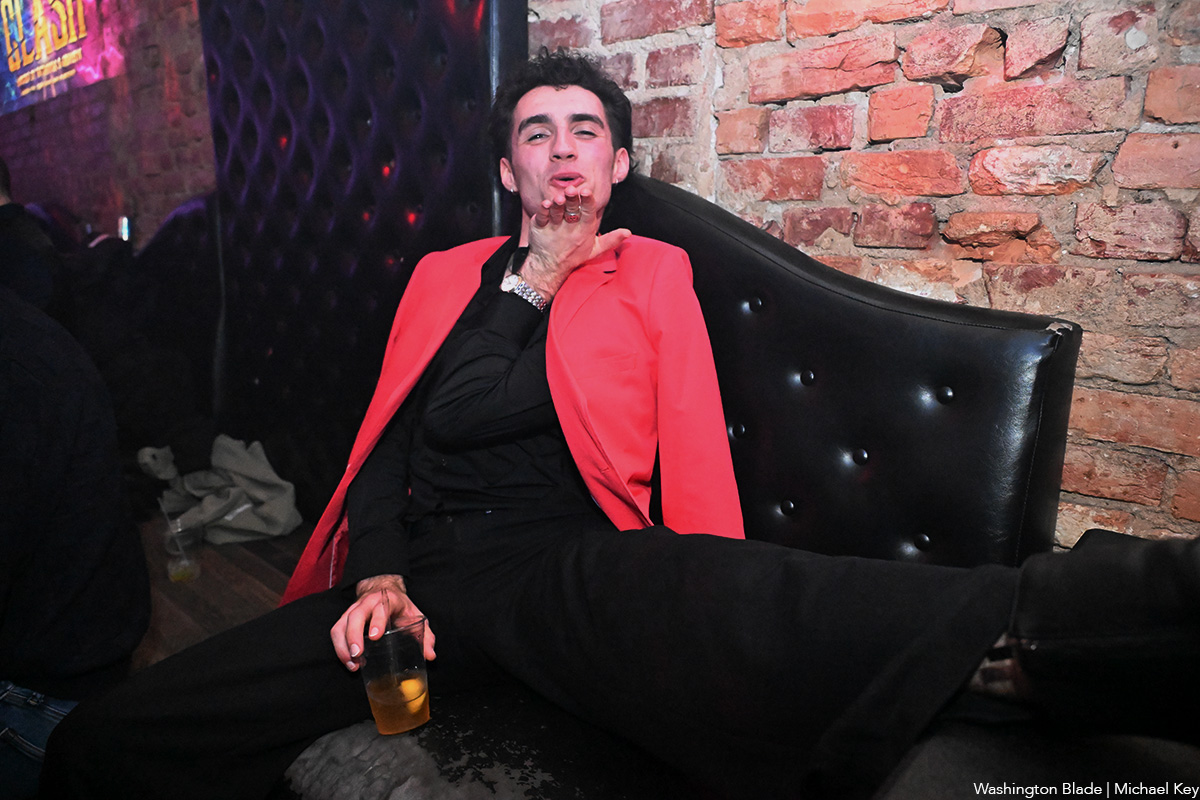
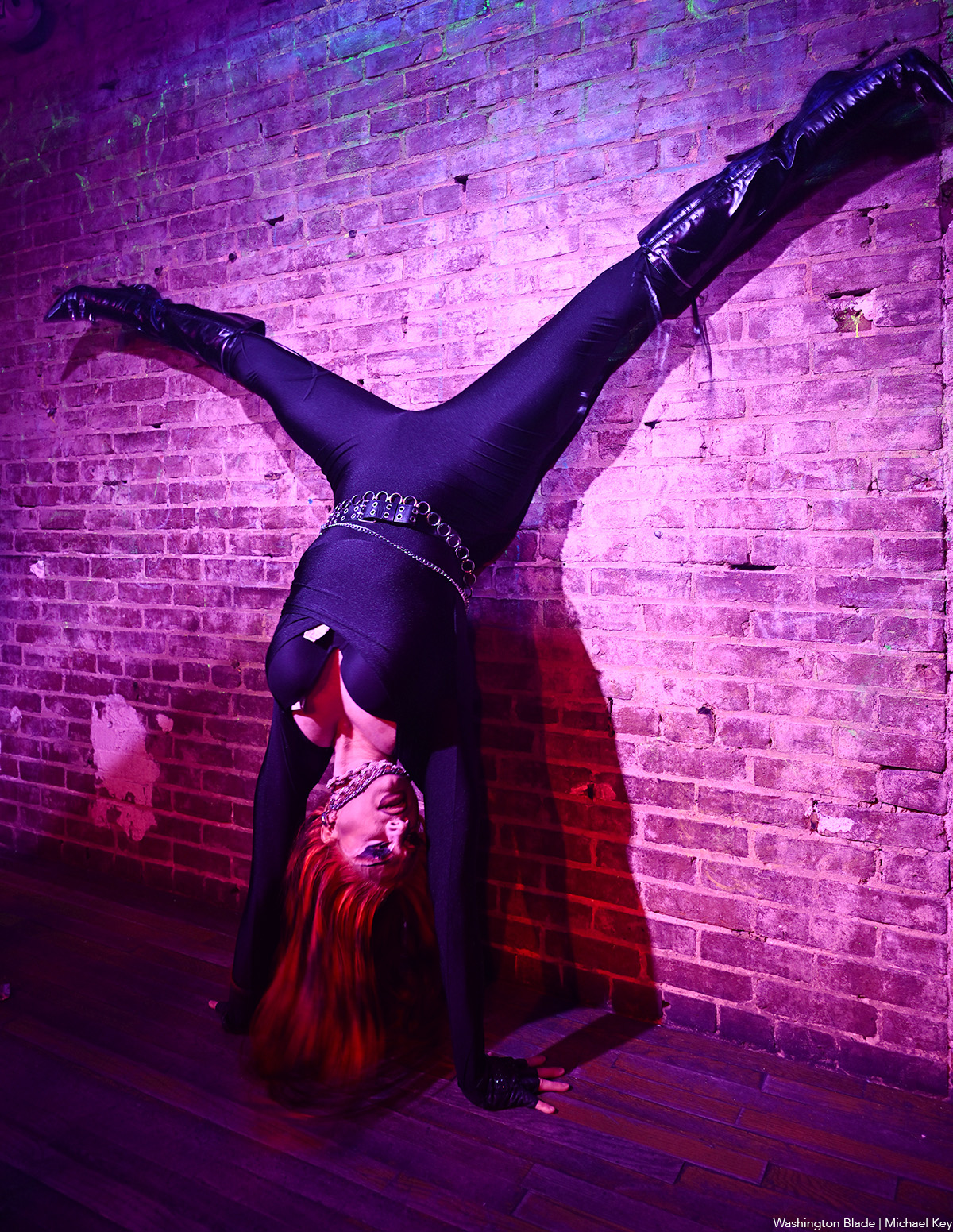
Theater
Magic is happening for Round House’s out stage manager
Carrie Edick talks long hours, intricacies of ‘Nothing Up My Sleeve’

‘Nothing Up My Sleeve’
Through March 15
Round House Theatre
4545 East-West Highway
Bethesda, Md. 20814
Tickets start at $50
Roundhousetheatre.org
Magic is happening for out stage manager Carrie Edick.
Working on Round House Theatre’s production of “Nothing Up My Sleeve,” Edick quickly learned the ways of magicians, their tricks, and all about the code of honor among those who are privy to their secrets.
The trick-filled, one-man show starring master illusionist Dendy and staged by celebrated director Aaron Posner, is part exciting magic act and part deeply personal journey. The new work promises “captivating storytelling, audience interaction, jaw-dropping tricks, and mind-bending surprises.”
Early in rehearsals, there was talk of signing a non-disclosure agreement (NDA) for production assistants. It didn’t happen, and it wasn’t necessary, explains Edick, 26. “By not having an NDA, Dendy shows a lot of trust in us, and that makes me want to keep the secrets even more.
“Magic is Dendy’s livelihood. He’s sharing a lot and trusting a lot; in return we do the best we can to support him and a large part of that includes keeping his secrets.”
As a production assistant (think assistant stage manager), Edick strives to make things move as smoothly as possible. While she acknowledges perfection is impossible and theater is about storytelling, her pursuit of exactness involves countless checklists and triple checks, again and again. Six day weeks and long hours are common. Stage managers are the first to arrive and last to leave.
This season has been a lot about learning, adds Edick. With “The Inheritance” at Round House (a 22-week long contract), she learned how to do a show in rep which meant changing from Part One to Part Two very quickly; “In Clay” at Signature Theatre introduced her to pottery; and now with “Nothing Up My Sleeve,” she’s undergoing a crash course in magic.
She compares her career to a never-ending education: “Stage managers possess a broad skillset and that makes us that much more malleable and ready to attack the next project. With some productions it hurts my heart a little bit to let it go, but usually I’m ready for something new.”
For Edick, theater is community. (Growing up in Maryland, she was a shy kid whose parents signed her up for theater classes.) Now that community is the DMV theater scene and she considers Round House her artistic home. It’s where she works in different capacities, and it’s the venue in which she and actor/playwright Olivia Luzquinos chose to be married in 2024.
Edick came out in middle school around the time of her bat mitzvah. It’s also around the same time she began stage managing. Throughout high school she was the resident stage manager for student productions, and also successfully participated in county and statewide stage management competitions which led to a scholarship at the University of Maryland, Baltimore County (UMBC) where she focused on technical theater studies.
Edick has always been clear about what she wants. At an early age she mapped out a theater trajectory. Her first professional gig was “Tuesdays with Morrie” at Theatre J in 2021. She’s worked consistently ever since.
Stage managing pays the bills but her resume also includes directing and intimacy choreography (a creative and technical process for creating physical and emotional intimacy on stage). She names Pulitzer Prize winning lesbian playwright Paula Vogel among her favorite artists, and places intimacy choreographing Vogel’s “How I learned to Drive” high on the artistic bucket list.
“To me that play is heightened art that has to do with a lot of triggering content that can be made very beautiful while being built to make you feel uncomfortable; it’s what I love about theater.”
For now, “Nothing Up My Sleeve” keeps Edick more than busy: “For one magic trick, we have to set up 100 needles.”
Ultimately, she says “For stage managers, the show should stay the same each night. What changes are audiences and the energy they bring.”

Friday, February 13
Center Aging Monthly Luncheon With Yoga will be at noon at the DC Center for the LGBT Community. Email Mac at [email protected] if you require ASL interpreter assistance, have any dietary restrictions, or questions about this event.
Go Gay DC will host “LGBTQ+ Community Happy Hour Meetup” at 7 p.m. at Freddie’s Beach Bar and Restaurant. This is a chance to relax, make new friends, and enjoy happy hour specials at this classic retro venue. Attendance is free and more details are available on Eventbrite.
Women in their Twenties and Thirties will be at 7 p.m. on Zoom. This is a social discussion group for queer women in the D.C. area. For more details, visit the group on Facebook.
Saturday, February 14
Go Gay DC will host “LGBTQ+ Community Brunch” at 11 a.m. at Freddie’s Beach Bar & Restaurant. This fun weekly event brings the DMV area LGBTQ community, including allies, together for delicious food and conversation. Attendance is free and more details are available on Eventbrite.
The DC Center for the LGBT Community will host a screening of “Love and Pride” at 1:30 p.m. This event is a joy-filled global streaming celebration honoring queer courage, Pride, and the power of love. It’s a bold celebration of courage and community — a fearless reminder of what we’ve overcome, how love is what makes us unstoppable, and how we have always turned fear into fierce. For more details, visit the Center’s website.
Sunday, February 15
LGBTQ+ Community Coffee and Conversation will be at 12 p.m. at As You Are. This event is for people looking to make more friends and meaningful connections in the LGBTQ community. Attendance is free and more details are available on Eventbrite.
Monday, February 16
Queer Book Club will be at 7:00p.m. on Zoom. This month’s read is “Faebound” by Saara El-Arifi. For more details, visit the DC Center’s website.
“Center Aging: Monday Coffee Klatch” will be at 10 a.m. on Zoom. This is a social hour for older LGBTQ+ adults. Guests are encouraged to bring a beverage of choice. For more information, contact Adam ([email protected]).
Tuesday, February 17
Center Bi+ Roundtable will be at 7 p.m. on Zoom. This is an opportunity for people to gather in order to discuss issues related to bisexuality or as Bi individuals in a private setting.Visit Facebook or Meetup for more information.
Wednesday, February 18
Job Club will be at 6 p.m. on Zoom upon request. This is a weekly job support program to help job entrants and seekers, including the long-term unemployed, improve self-confidence, motivation, resilience and productivity for effective job searches and networking — allowing participants to move away from being merely “applicants” toward being “candidates.” For more information, email [email protected] or visit thedccenter.org/careers.
Thursday, February 19
The DC Center’s Fresh Produce Program will be held all day at the DC Center for the LGBT Community. To be fair with who is receiving boxes, the program is moving to a lottery system. People will be informed on Wednesday at 5 p.m. if they are picked to receive a produce box. No proof of residency or income is required. For more information, email [email protected] or call 202-682-2245.
Virtual Yoga Class will be at 7 p.m. on Zoom. This free weekly class is a combination of yoga, breath work and meditation that allows LGBTQ+ community members to continue their healing journey with somatic and mindfulness practices. For more details, visit the DC Center’s website.

















